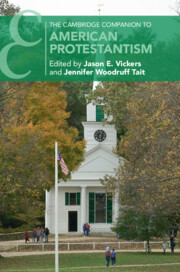Book contents
- The Cambridge Companion to American Protestantism
- Cambridge Companions to Religion
- The Cambridge Companion to American Protestantism
- Copyright page
- Dedication
- Contents
- Contributors
- Acknowledgments
- Introduction
- Part I Historical Overview
- Part II The Religious Culture of American Protestantism
- Part III Theological Traditions
- 17 Anglicanism
- 18 The Reformed Tradition
- 19 The Lutheran Tradition
- 20 Brethren and Mennonite Traditions
- 21 Baptists
- 22 The Stone-Campbell Movement
- 23 Wesleyan-Methodist and Holiness Traditions
- 24 Pentecostalism
- Selected Bibliography
- Index
- Cambridge Companions to Religion (continued from page ii)
21 - Baptists
from Part III - Theological Traditions
Published online by Cambridge University Press: 11 May 2022
- The Cambridge Companion to American Protestantism
- Cambridge Companions to Religion
- The Cambridge Companion to American Protestantism
- Copyright page
- Dedication
- Contents
- Contributors
- Acknowledgments
- Introduction
- Part I Historical Overview
- Part II The Religious Culture of American Protestantism
- Part III Theological Traditions
- 17 Anglicanism
- 18 The Reformed Tradition
- 19 The Lutheran Tradition
- 20 Brethren and Mennonite Traditions
- 21 Baptists
- 22 The Stone-Campbell Movement
- 23 Wesleyan-Methodist and Holiness Traditions
- 24 Pentecostalism
- Selected Bibliography
- Index
- Cambridge Companions to Religion (continued from page ii)
Summary
Ever since their seventeenth-century origins, Baptists have represented an array of theological, racial, ethnic, ideological, and political backgrounds and have traversed a number of social, theological, and ecclesiastical roads. The first Baptists came out of the dissenting tradition in England; the persecution they experienced during their early history in America helps explain their enduring support for the separation of church and state. Baptists make the Bible central to their practice, an emphasis central to their disputes over slavery, gender, and sexuality. They value the theological notion of the “priesthood of the believer.” Baptists hold that only people who can publicly profess their Christian conversion can be candidates for baptism. They have varied on who can take the Lord’s Supper; many Baptist churches practice open communion, but some do not. A central tenet of Baptist governance is the autonomy of the local church.
- Type
- Chapter
- Information
- The Cambridge Companion to American Protestantism , pp. 402 - 418Publisher: Cambridge University PressPrint publication year: 2022

